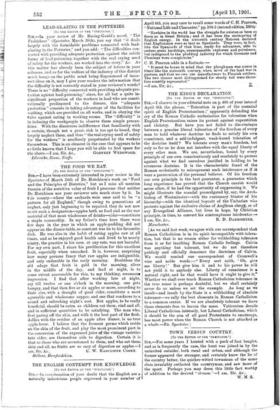THE FOOD WE EAT.
• [TO THE EDITOR OF VIE "SPECTATOR."]
Stu,—I have been extremely interested in your review in the Spectator of March 24th of Dr. Hutchison's work on "Food and the Principles of Dietetics," but as I miss all mention therein of the nutritive value of fruit I presume that neither Dr. Hutchison nor your reviewer sets much store by it. In this county—where the orchards were once said to be "a pattern for all England," though owing to generations of neglect, only just beginning to be repaired, they do not now merit such a designation—apples both as food and as the raw material of that most wholesome of drinks—cider—constitute a staple commodity. In my father's time here there were few days in the year in which an apple-pudding did not appear on the dinner-table, so constant was he to his favourite dish. He was also in the habit of eating apples raw at all times, and as he enjoyed good health and lived to be nearly ninety, the practice in his case, at any rate, was not harmful. For my own part, I share his predilection for this excellent fruit, especially when uncooked. It is, however, surprising how many persons fancy that raw apples are indigestible, and only endurable in the early morning. Doubtless the old adage that fruit is gold in the morning, silver in the middle of the day, and lead at night, is to some extent answerable for this,' to my thinking, erroneous impression. I find that after working late at night, say till twelve or one o'clock in the morning, one gets hungry, and that then five or six apples or more, according to their size, with a draught of good cider, constitute a most agreeable and wholesome supper, and one that conduces to a sound and refreshing night's rest. But apples, to be really beneficial, should be eaten as children eat them, rind and all, and in sufficient quantities to be satisfying. The man who, first paring off the skin, and with it the best part of the flesh, dates with the residue of an apple after dinner, is no true apple-lover. I believe that the ferment germs which reside on the skin of the fruit, and play the most prominent part in the conversion of the expressed juice of the vintage varieties into cider, are themselves aids to digestion. Certain it is that to those who are accustomed to them, and"who eat them skin and-all, no fruits are so easy of digestion as apples.—I






































 Previous page
Previous page